Goals
The University of California strives to create diverse, equitable, and inclusive communities for students, faculty, and staff. The University supports initiatives that increase the representation of historically underrepresented populations and foster inclusive living, learning, and working environments.
The University’s diversity goals are established in Regents Policy 4400: University of California Diversity Statement, which states, in part:
- Because the core mission of the University of California is to serve the interests of the State of California, it must seek to achieve diversity among its student bodies and among its employees.
- The State of California has a compelling interest in making sure that people from all backgrounds perceive that access to the University is possible for talented students, staff, and faculty from all groups.
- Therefore, the University of California renews its commitment to the full realization of its historic promise to recognize and nurture merit, talent, and achievement by supporting diversity and equal opportunity in its education, services, and administration, as well as research and creative activity.
Evaluating diversity
UC evaluates its diversity outcomes in a variety of ways: current demographic characteristics and trends of its students, faculty, and staff; analysis of the academic pipeline from entry to exit; and survey data that reveal perceptions of campus climate, experiences of campus life, and remote learning during the COVID-19 pandemic.
Chapters 1 through 6 of the Accountability Report present an overview of trends for undergraduate, graduate academic and graduate professional students, faculty, and staff. This feeds into a holistic analysis of University diversity, equity, and inclusion outcomes using the demographic characteristics of race/ethnicity, gender, first-generation college-going status, and international student status.
The University of California’s multi-year framework — UC 2030 — focuses on expanding the pipeline to and within the University. For example, one consequence of eliminating timely graduation gaps for underrepresented groups is that a greater proportion will go on to graduate school, and one of the goals of growing graduate enrollment is to increase spaces for these students. UC’s increasing diversity of doctoral students will expand the availability pool of potential faculty hires, supporting efforts to diversify the professoriate.
Surveying students about diversity on campus
This chapter presents responses to the UC Graduate Student Experience Survey (UCGSES) and the UC Undergraduate Experience Survey (UCUES). The University’s goal is to have all its students feel respected on campus, regardless of race/ethnicity, nationality, religious affiliation, gender identity, gender expression, sexual orientation, or political beliefs.
UC freshman enrollees do not reflect the diversity of California’s high school graduates, with A-G completions and UC applications being two opportunities for improvement.
7.1.1 Racial/ethnic distribution of the UC undergraduate pipeline, Universitywide, Fall 2022 new freshman cohort from California public high schools
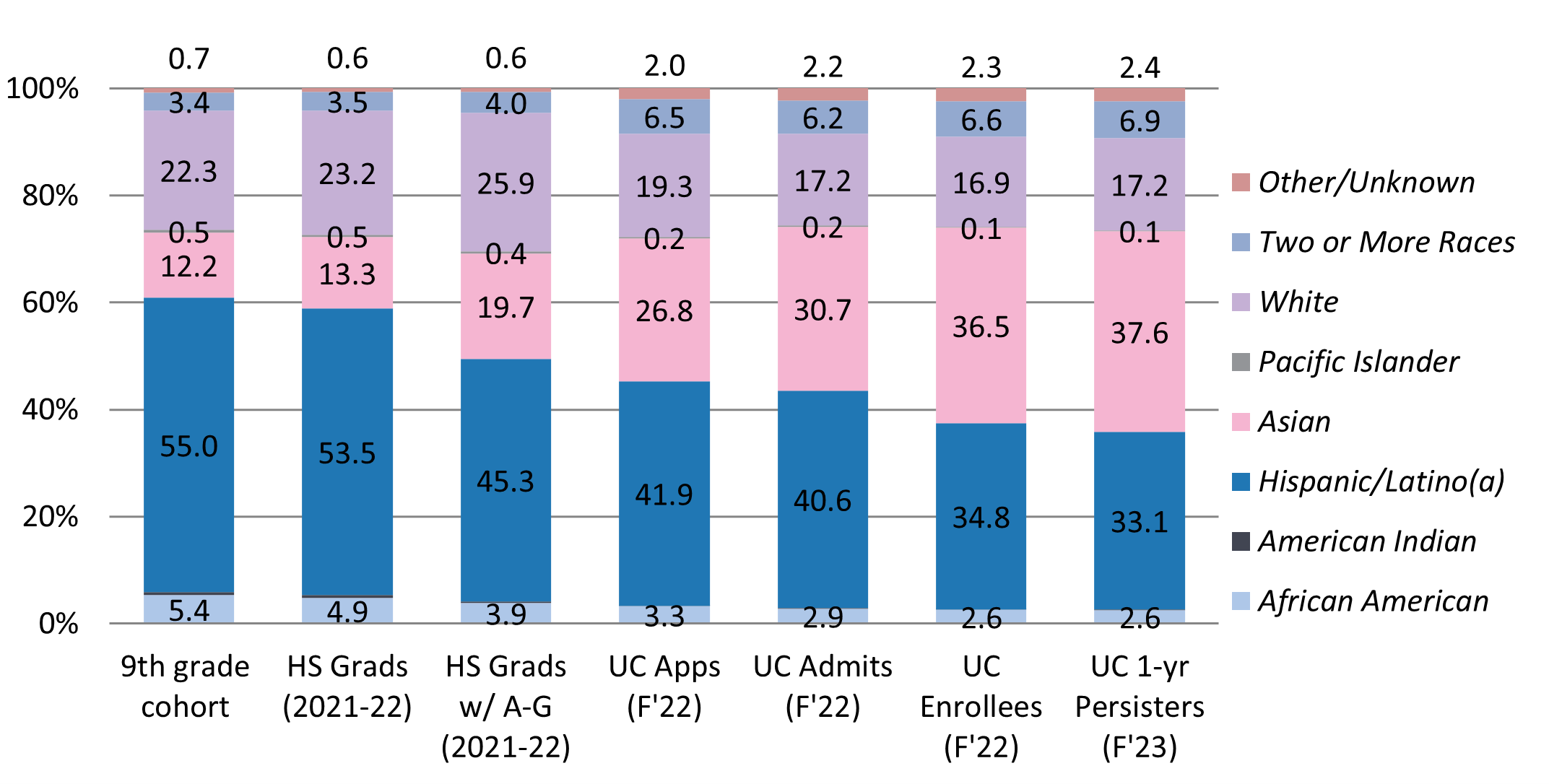
Sources: California Department of Education; UC Data Warehouse
The gaps between underrepresented student high school graduates and UC freshman applicants and admits has declined in the last several years, while the new enrollees gap has not.
7.1.2 Share of high school graduates, applicants, admits, and enrollees, Universitywide

Gap analysis dashboard
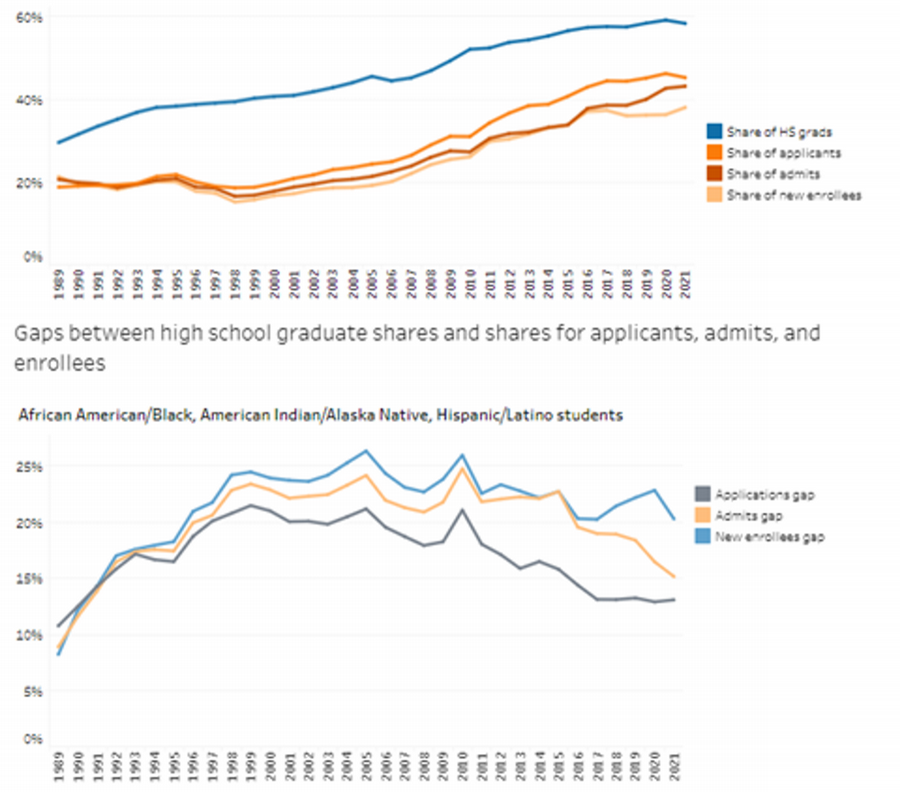
Gaps still exist between the share of transfer-ready California community college students and the share of UC applicants, admits, and new enrollees for underrepresented groups.
7.1.3 Share of transfer-ready applicants, admits, and enrollees from California community colleges, Universitywide

Gap analysis dashboard
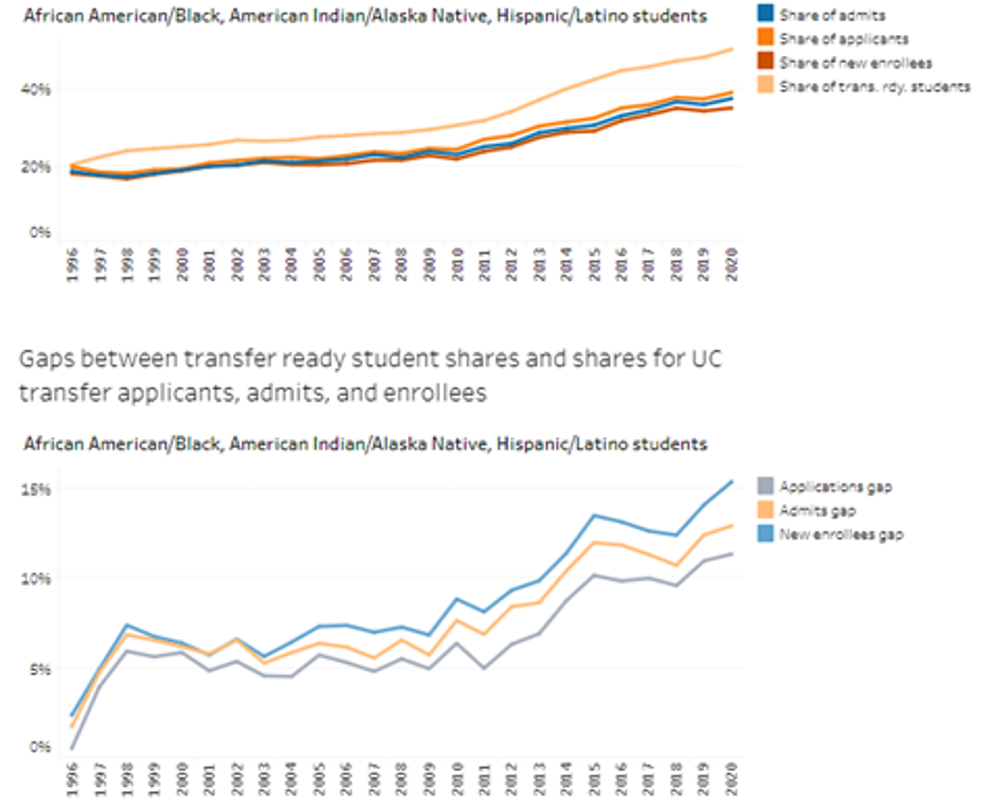
UC academic doctoral programs are a strong draw for international students who did not earn their bachelor's degree in the United States.
7.2.1 Racial/ethnic distribution of U.S. BA/BS degree recipients from US and UC institutions compared to UC doctoral applicants, admits, and enrollees, Universitywide, 2021-22
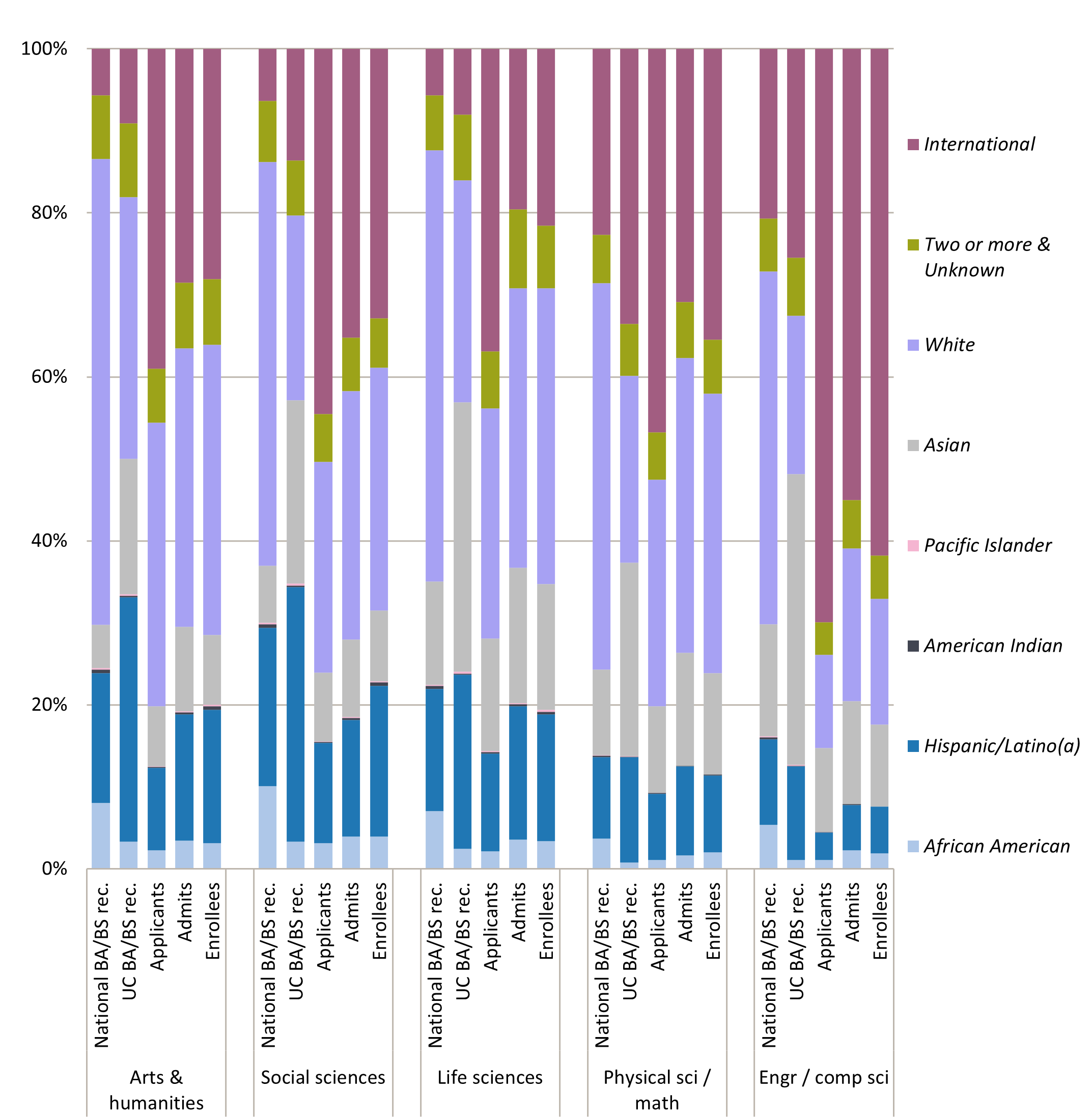
Sources: Integrated Postsecondary Educational Data System; UC Information Center Data Warehouse
In graduate academic doctoral programs, UC is approaching parity with the gender diversity of U.S. institutions, except in some STEM disciplines.
7.2.2 Gender distribution of U.S. BA/BS degree recipients from US and UC institutions compared to UC doctoral applicants, admits, and enrollees, Universitywide, 2021-22
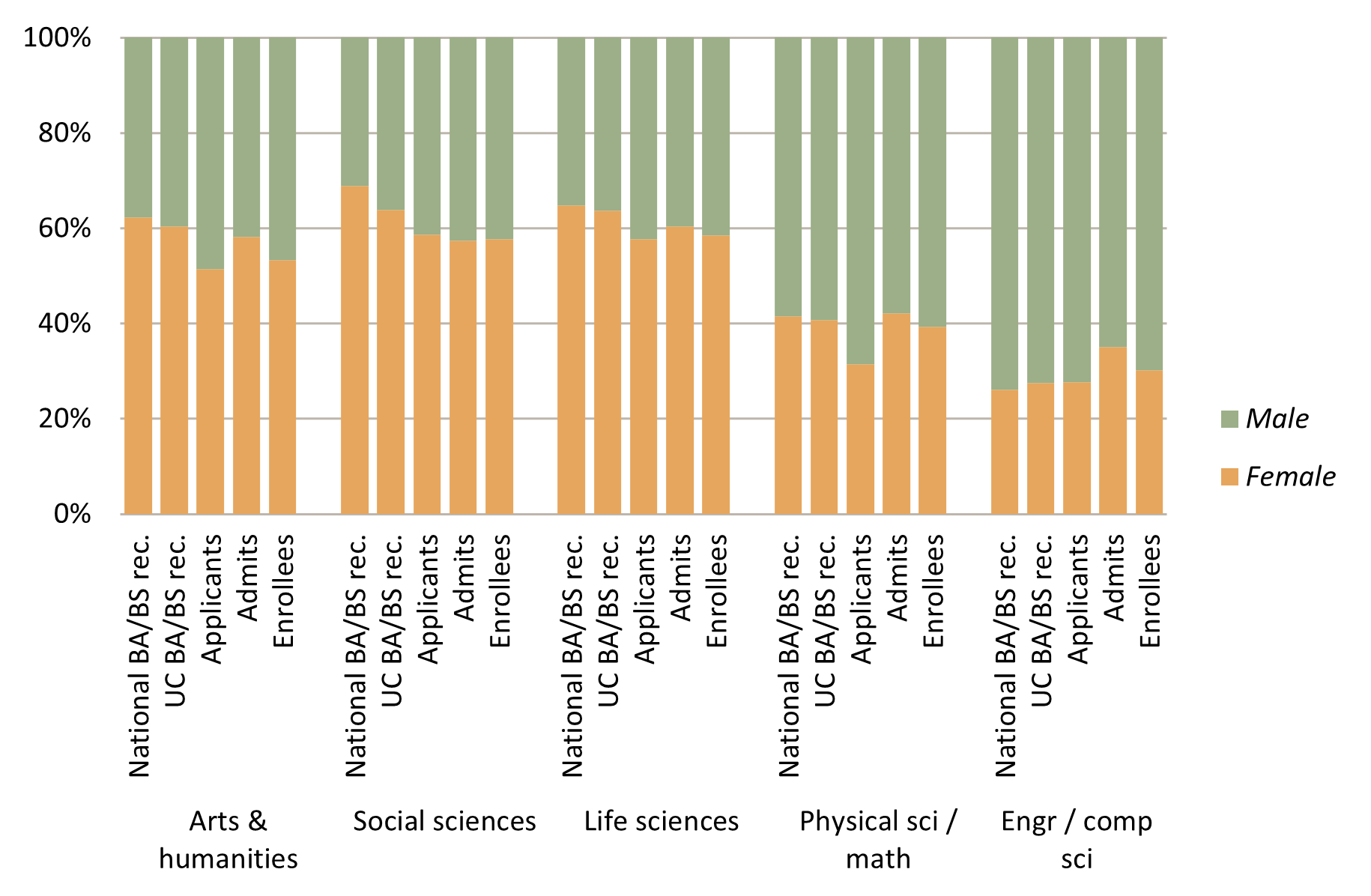
Sources: Integrated Postsecondary Educational Data System; UC Information Center Data Warehouse
While percentages are increasing at most campuses, African American, American Indian, and Hispanic/Latino(a)* graduate and professional students are less likely than other students to feel included on campus.
7.2.3 Percent who agree or strongly agree to “I feel included by my peers,” Universitywide and UC campuses, Spring 2021 and 2023
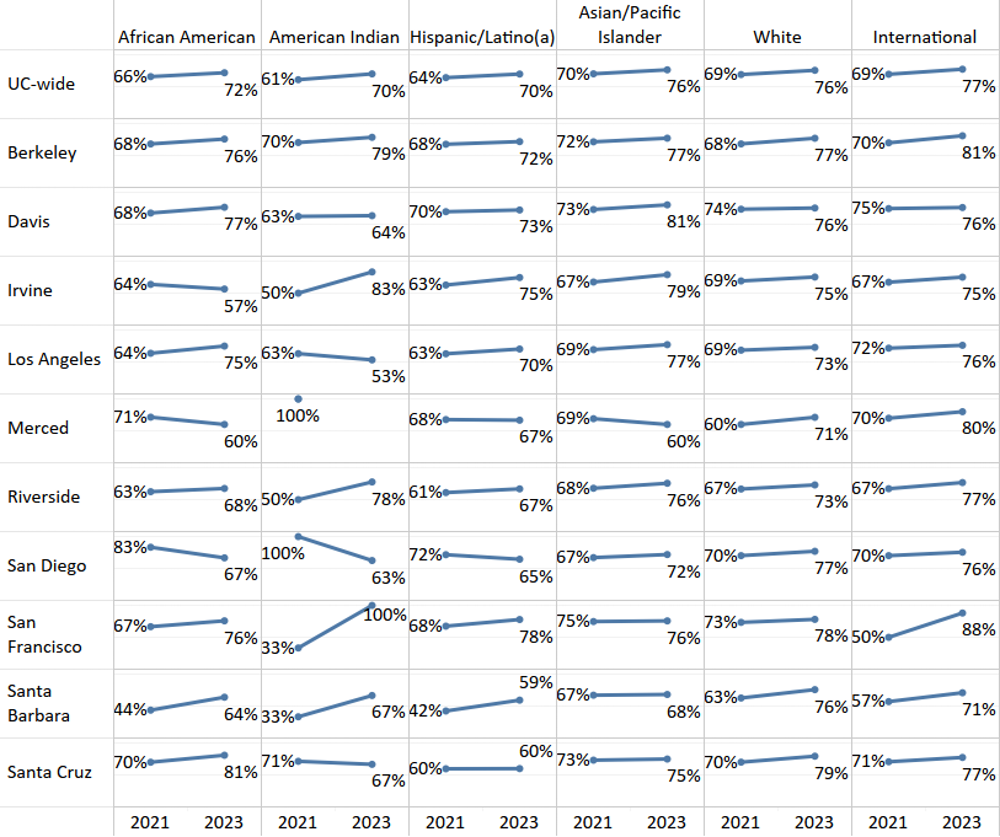
Source: UC Graduate Student Experience Survey
The University of California Graduate Student Experience Survey (UCGSES) is a systemwide survey that offers valuable insight about population-based experiences of respect and belonging. The survey was administered for the first time in Spring 2021. The complete data tables for UCGSES are available at the UC Information Center:
UCGSES 2021 data tables
UCGSES 2023 data tables
*The UC Accountability report convention uses Latinx for Hispanic/Latinx people.
Latino(a) is used in the UCGSES survey so that terminology carries here.
While percentages are improving at many UC campuses, African American, American Indian, and Hispanic/Latino(a)* graduate and professional students are less likely than other students to feel that their culture is respected on campus.
7.2.4 Percent who agree or strongly agree to “My culture is respected by my peers,” Universitywide and UC campuses, Spring 2021 and 2023
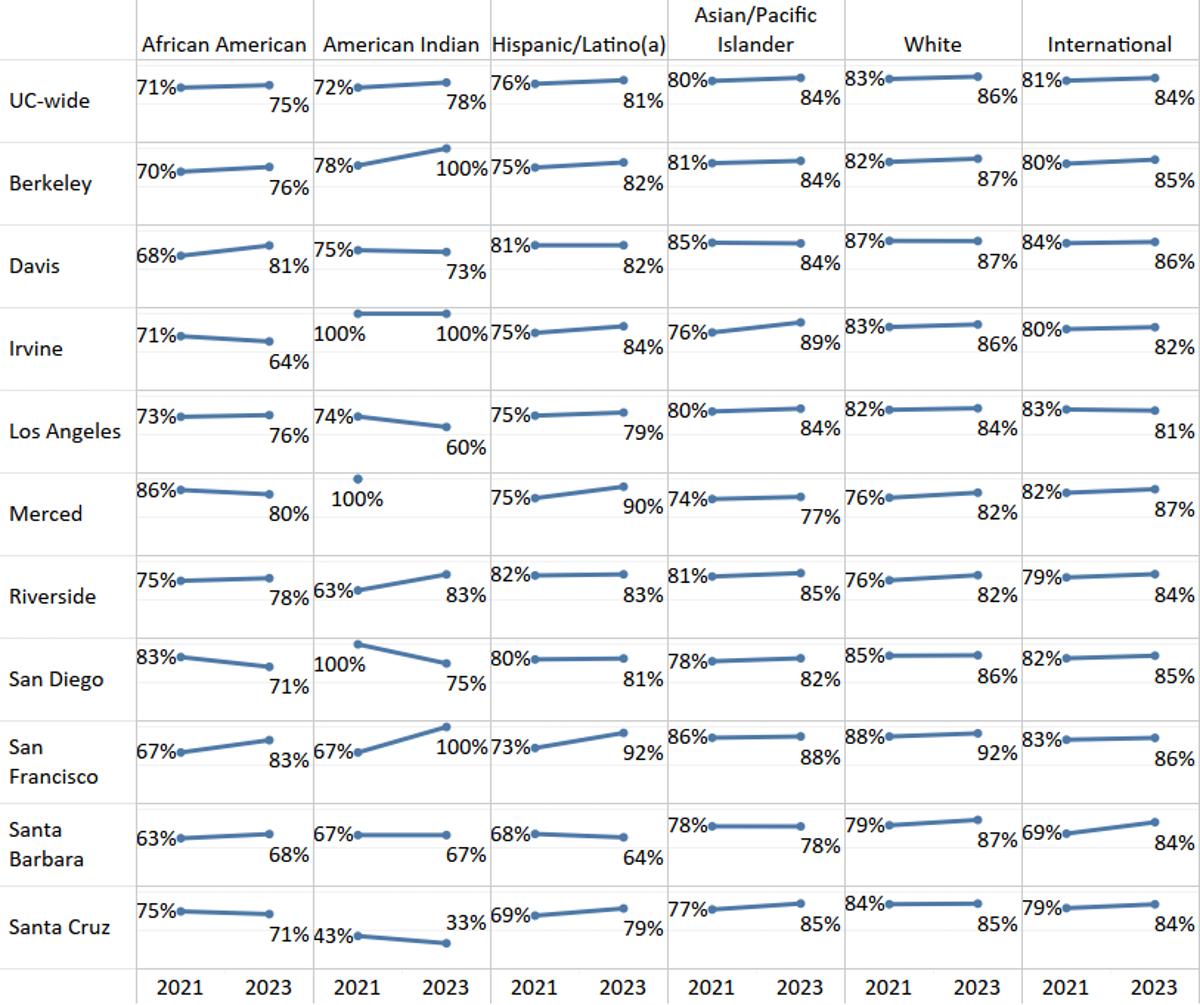
Source: UC Graduate Student Experience Survey
The University of California Graduate Student Experience Survey (UCGSES) is a systemwide survey that offers valuable insight about population-based experiences of respect and belonging. The survey was administered for the first time in Spring 2021. The complete data tables for UCGSES are available at the UC Information Center:
UCGSES 2021 data tables
UCGSES 2023 data tables
*The UC Accountability report convention uses Latinx for Hispanic/Latinx people.
Latino(a) is used in the UCGSES survey so that terminology carries here.
Undergraduates have the highest proportion of underrepresented students. Faculty are less diverse overall.
7.3.1 Racial/ethnic distribution of students and faculty, Universitywide, Selected years, fall 2014 to 2023
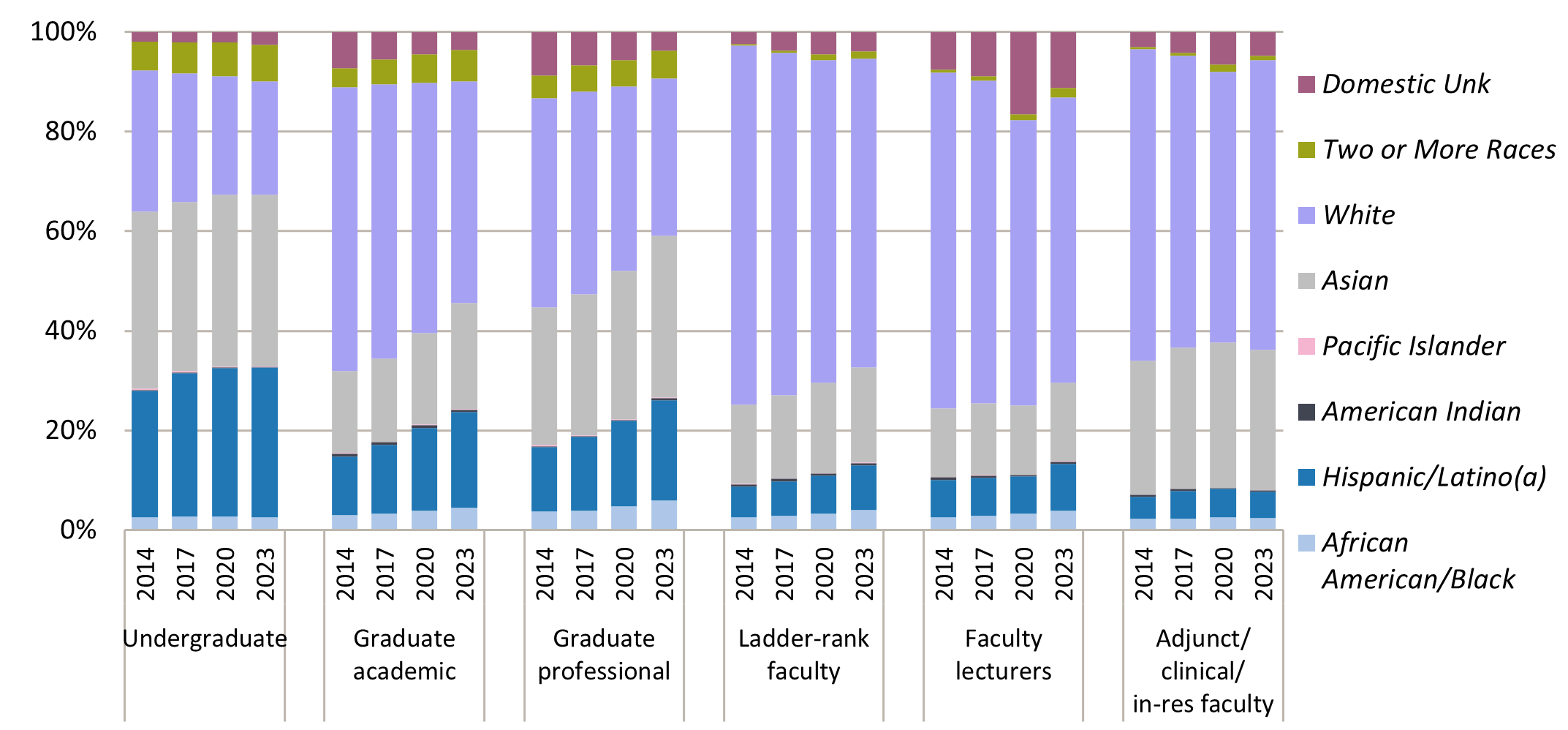
Source: UC Information Center Data Warehouse. Undergraduates include postbaccalaureate teaching credential students.
Only includes U.S. citizens and permanent residents for students; all faculty are included regardless of residency.
Information on faculty availabilities compared to hires by discipline group is presented in Chapter 5 at Indicator 5.3.1a, 5.3.1b, and 5.3.1c.
African American undergraduate students are less likely than other students to feel that students of their race/ethnicity are respected or belong on their campus.
7.4.1a Percent who agree or strongly agree to “Students of my race/ethnicity are respected on this campus,” Universitywide and UC campuses, Spring 2022

Source: UCUES. Caution should be exercised in interpretation of the Native American and Pacific Islander groups due to small cell sizes.
7.4.1b Percent who agree or strongly agree to “I feel I belong at this university,” Universitywide and UC campuses, Spring 2022

Source: UCUES. Caution should be exercised in interpretation of the Native American and Pacific Islander groups due to small cell sizes.
7.4 UNDERGRADUATE CAMPUS CLIMATE
Undergraduate students vary widely in whether they feel their religious beliefs are respected, with fewer Jewish and Muslim students responding that they feel respected.
7.4.2 Percent who agree or strongly agree to “Students of my religious beliefs are respected on this campus,” Universitywide and UC campuses, Spring 2022

Source: UCUES
Undergraduates who identify as asexual, bisexual, gay or lesbian, queer, or pansexual are less likely to feel respected on campus than those who do not.
7.4.3 Response to “Students of my sexual orientation are respected on this campus” and "I feel that I belong at this university' by sexual orientation, Spring 2022
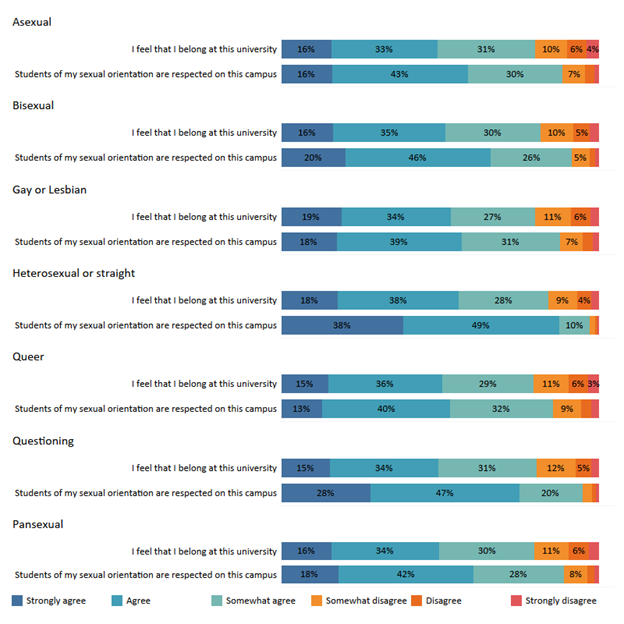
Source: UCUES. Students could choose more than one identity.
Undergraduates who identify as other than male or female are less likely to feel respected on campus than those who do not.
7.4.4 Response to “Students of my gender are respected on this campus,” Spring 2022

Source: UCUES
Very conservative undergraduates are less likely to feel that students of their political views are respected on campus.
7.4.5 Response to “Students of my political beliefs are respected on this campus,” Universitywide, Spring 2022

Source: UCUES













